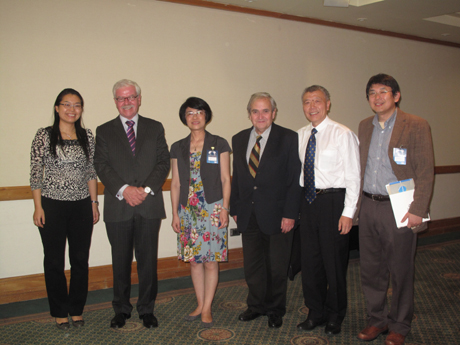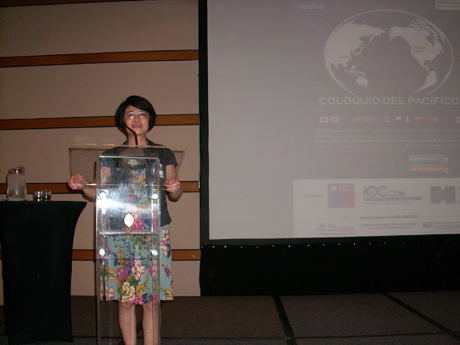
 Professor Chen Jingyin, Dean of SUIBE Law School, Professor FengJun and Associate Professor Huang Jie were recently invited toattend the “Pacific Rim Colloquium: Economic Development andHarmonization of Commercial Law” held in Santiago, the capital cityof Chile, on 17-19 October 2013. The regional colloquium wasco-organized by the National Law Center for Inter-American FreeTrade (NatLaw) and the Law School at Universidad Mayor in Chile(UM), and sponsored by the Chillan Government, InternationalChamber of Commerce Chile (ICC Chile), and the Asian DevelopmentBank (ADB), with the purpose of establishing a common agenda andworking groups on areas of commercial law ripe for unification orharmonization throughout the Pacific region, particularly giventheir contributions to economic development. Participants includedexperts and government officials from Trans-Pacific Latin Americanand East Asian countries such as the United States, China, Canada,Chile, Columbia, Mexico, Honduras, Japan, New Zealand, Peru andVietnam.
Professor Chen Jingyin, Dean of SUIBE Law School, Professor FengJun and Associate Professor Huang Jie were recently invited toattend the “Pacific Rim Colloquium: Economic Development andHarmonization of Commercial Law” held in Santiago, the capital cityof Chile, on 17-19 October 2013. The regional colloquium wasco-organized by the National Law Center for Inter-American FreeTrade (NatLaw) and the Law School at Universidad Mayor in Chile(UM), and sponsored by the Chillan Government, InternationalChamber of Commerce Chile (ICC Chile), and the Asian DevelopmentBank (ADB), with the purpose of establishing a common agenda andworking groups on areas of commercial law ripe for unification orharmonization throughout the Pacific region, particularly giventheir contributions to economic development. Participants includedexperts and government officials from Trans-Pacific Latin Americanand East Asian countries such as the United States, China, Canada,Chile, Columbia, Mexico, Honduras, Japan, New Zealand, Peru andVietnam.
The colloquium set up four working groups on electronic warehousereceipts, secured transactions, simplified stock corporations,insolvency and bankruptcy. Professor Chen gave a speech on “RecentDevelopment of Electronic Warehouse Receipts in China”, whileProfessor Feng discussed “Legal Issues for Warehouse ReceiptFinancing in China”. In addition, Professor Chen, on behalf of theworking group on electronic warehouse receipts, made a concludingspeech at the meeting, summarizing the developments of electronicwarehouse receipts in countries such as China, the United Statesand Mexico, and in particular, pointing out current legal problemsand identifying key priorities for legal reform in electronicwarehouse receipts.
Participants at the meeting spoke highly of the research by SUIBElaw professors, and it was unanimously agreed that SUIBE would bethe organizer for 2014 Pacific Rim Colloquium in Shanghai.
Professor Chen has been invited by the Organization of AmericanStates (OAS) to take part in the project of drafting OAS Modal Lawfor Electronic Warehouse Receipts, which is currently underway.
